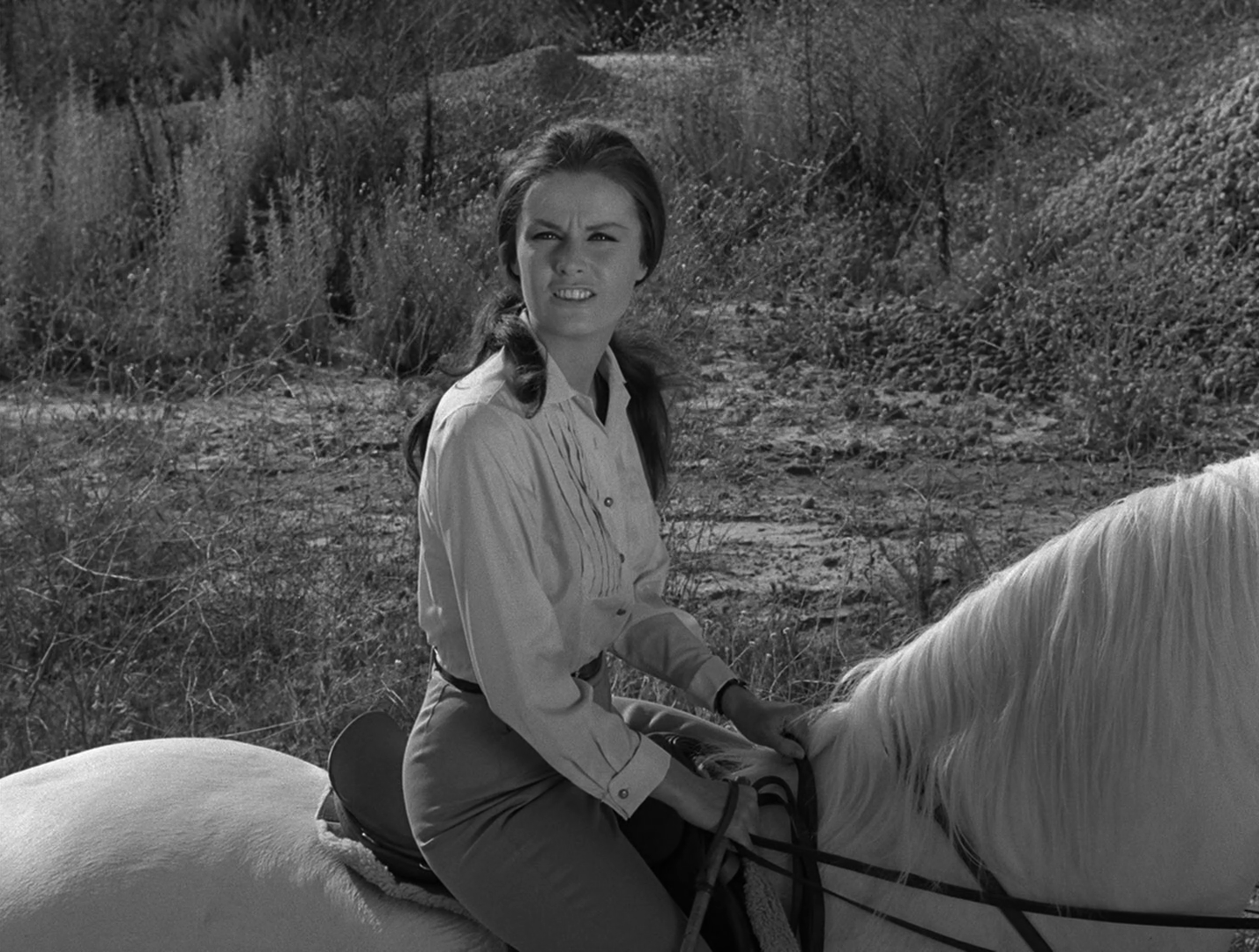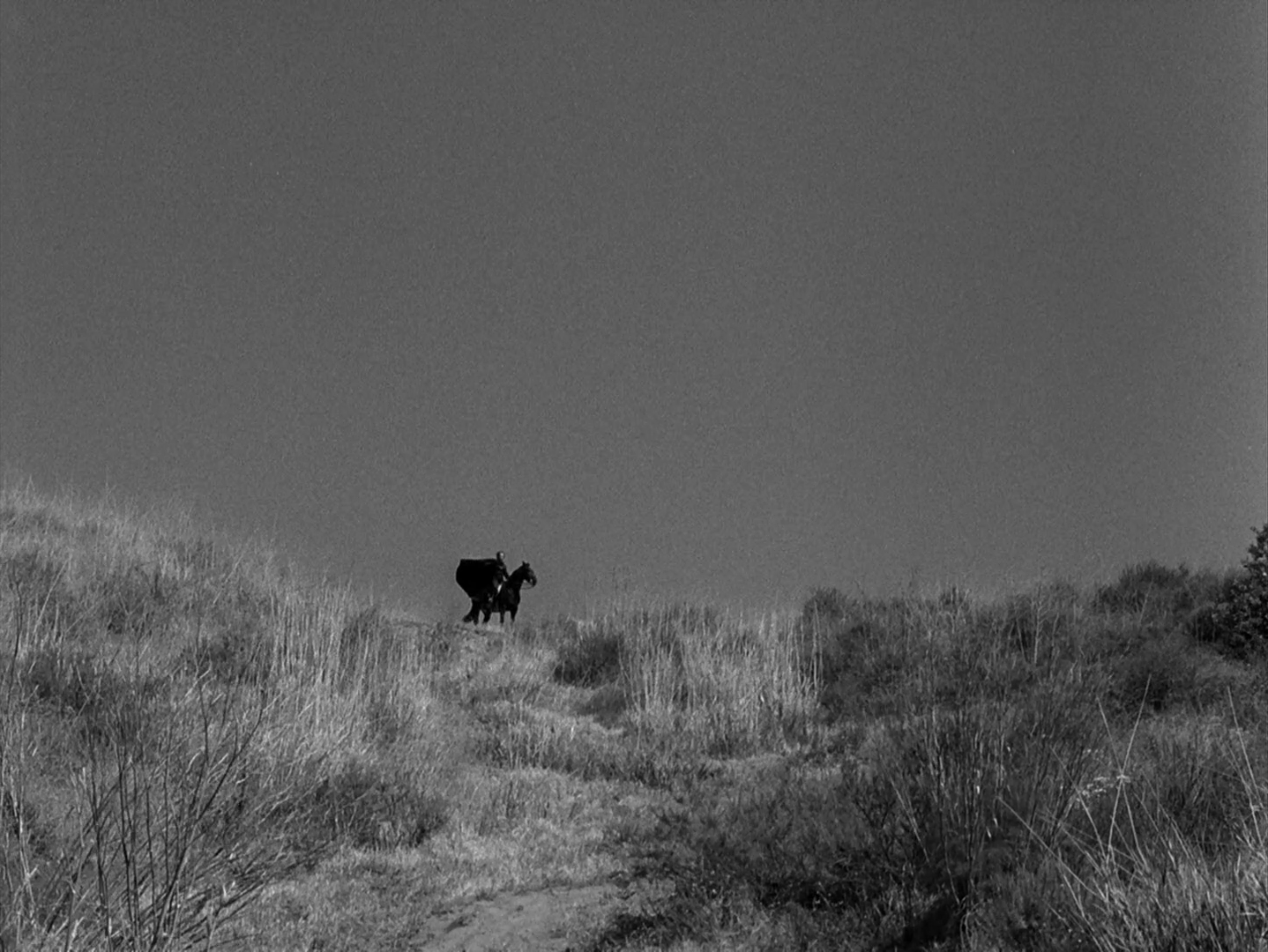Season 5, Episode 21 (141 overall)
Originally aired 2/21/1964
Cayuga Production # 2608
Young Anne Henderson is out for a relaxing horseback ride on her family’s sprawling Southern estate. Atop a hill, an ominous figure appears, also on horseback, clad in black and, with a blood-chilling shriek, tears down the hillside on an intercept course. Anne, naturally frightened, heads hurriedly for home. An exciting prologue, right? Who is this mysterious harbinger of doom? Is it a vicious demon? A vindictive ghost? Or maybe our old friend “The Hitch-hiker,” now traveling by horse instead of thumbing rides?
Viewers fifty years ago tonight quickly realized that it was none of those things. Thanks to a questionable (or, more to the point, stupid) directorial choice, we see the identity of Anne’s pursuer immediately. It’s herself, older and apparently really pissed off.
Young Anne is about to marry Robert Blake, who has a bright future ahead of him and whom her parents approve of. However, her heartstrings are being seriously tugged on by no-good loafer David Mitchell, who implores her to run away with him, much to everyone’s chagrin.
 Meanwhile, 25 years in the future, the Henderson mansion is in a state of advanced disrepair and is about to be foreclosed upon. Nursing a stiff drink, Anne blames her dead father for spoiling her when she was young, which led to her choosing the wrong man. David enters, drunkenly taunting her. She flees the house, mounts her horse, and rides to the hilltop… and looks down at her younger self. She races down the hill and gives chase in what will be, as it always is, a futile pursuit.
Meanwhile, 25 years in the future, the Henderson mansion is in a state of advanced disrepair and is about to be foreclosed upon. Nursing a stiff drink, Anne blames her dead father for spoiling her when she was young, which led to her choosing the wrong man. David enters, drunkenly taunting her. She flees the house, mounts her horse, and rides to the hilltop… and looks down at her younger self. She races down the hill and gives chase in what will be, as it always is, a futile pursuit. Exceedingly melodramatic and painfully soapy, Richard Matheson's “Spur of the Moment” isn’t one of season five’s better offerings. Young Anne is excruciatingly annoying, a drama queen clearly desperate for attention. Future Anne is abrasive and bitter, blaming her shitty life on the fact that her father spoiled her as a child. Um, seriously? Marrying David was a bad choice, and maybe it happened partially because of her spoiled-child-rebellion-phase, but what’s prevented her from divorcing him at some point in the 25 years that he’s been making her life miserable? It’s her that’s opted to stay with his sorry ass, not her deceased father.
Exceedingly melodramatic and painfully soapy, Richard Matheson's “Spur of the Moment” isn’t one of season five’s better offerings. Young Anne is excruciatingly annoying, a drama queen clearly desperate for attention. Future Anne is abrasive and bitter, blaming her shitty life on the fact that her father spoiled her as a child. Um, seriously? Marrying David was a bad choice, and maybe it happened partially because of her spoiled-child-rebellion-phase, but what’s prevented her from divorcing him at some point in the 25 years that he’s been making her life miserable? It’s her that’s opted to stay with his sorry ass, not her deceased father. We only know the woman in black’s identity because the camera pans in for a close shot of her face, yet somehow Anne can see her “glaring” at her from the top of the hill (which would be impossible from that far away). By the same token, Future Anne couldn't possibly recognize her younger self from that distance; however, it’s more puzzling why she’d assume it’s her younger self at all (we know it’s The Twilight Zone, but she doesn’t).
We only know the woman in black’s identity because the camera pans in for a close shot of her face, yet somehow Anne can see her “glaring” at her from the top of the hill (which would be impossible from that far away). By the same token, Future Anne couldn't possibly recognize her younger self from that distance; however, it’s more puzzling why she’d assume it’s her younger self at all (we know it’s The Twilight Zone, but she doesn’t). |
| Anne and Yang. |
As repellent as both Annes are, the episode isn’t exactly a total loss. I suppose the production values are fine; I think this is the only time in the entire series that we see a full-on chase on horseback. The costuming choice to have Future Anne wearing all black and riding a black horse (symbolizing the darkness of her life) and Young Anne wearing all white and riding a white horse (symbolizing her relative purity) is a nice touch, if a bit obvious. The juxtaposition of the Henderson mansion in the two different time periods (pristine in the family’s happier, richer days, run down and almost devoid of furniture in the dark future) is effective.
When Future Anne throws her drink at David before running off for yet another attempt to warn her younger self, David breaks down into drunken tears. Is it just me, or does he look just like Dan Duryea in “Mr. Denton on Doomsday”?
THE MUSIC
“Spur of the Moment” features an original score by Rene Garriguenc which, like all season five scores, has never enjoyed an official soundtrack release. You’ll find it, however, isolated on its own track on the season five DVD/blu-ray sets. The score is overly melodramatic; it sounds like accompaniment for silent films (where’s the mustache-twirling villain?). Like everything else here, it grates on my nerves.
FAMILIAR FACES
Diana Hyland (Anne Henderson) only has a smattering of genre roles on her resume, among them two Alfred Hitchcock Hours (“To Catch a Butterfly” And “Beyond the Sea of Death”) and two episodes of The Invaders (“Vikor” and the two-part “Summit Meeting”… I guess that’s technically three episodes). She’s probably best remembered for her work on TV’s Peyton Place (1968-69), which this soap-operatic episode certainly prepared her for.
 That no-account rascal David Mitchell is played by Roger Davis in his only Twilight Zone appearance. He’d cross paths with Rod Serling again in 1972 on Night Gallery (“You Can Come Up Now, Mrs. Millikan”). Other notable genre credits include 128 episodes of Dark Shadows (1968-1970; more soapiness!) and the hilariously awful Galactica 1980 (“The Night the Cylons Landed”).
That no-account rascal David Mitchell is played by Roger Davis in his only Twilight Zone appearance. He’d cross paths with Rod Serling again in 1972 on Night Gallery (“You Can Come Up Now, Mrs. Millikan”). Other notable genre credits include 128 episodes of Dark Shadows (1968-1970; more soapiness!) and the hilariously awful Galactica 1980 (“The Night the Cylons Landed”). The reliable and upstanding Robert Blake is played by Robert Hogan, who also popped up on Serling’s Night Gallery (1971’s “Brenda," a thoroughly stupid segment about a lonely girl and the swamp monster that befriends her. Yes, you heard that right; incidentally, the teleplay was written by TZ producer Buck Houghton under a pseudonym... can't say I blame him). Ahem, back to business. Hogan was also a regular on Peyton Place, so that connects him to Diana Hyland.
The reliable and upstanding Robert Blake is played by Robert Hogan, who also popped up on Serling’s Night Gallery (1971’s “Brenda," a thoroughly stupid segment about a lonely girl and the swamp monster that befriends her. Yes, you heard that right; incidentally, the teleplay was written by TZ producer Buck Houghton under a pseudonym... can't say I blame him). Ahem, back to business. Hogan was also a regular on Peyton Place, so that connects him to Diana Hyland.
As Mr. Henderson, this is Philip Ober’s only TZ appearance; however, he showed up on both of Alfred Hitchcock’s TV series (“Burglar Proof” on Alfred Hitchcock Presents and “I Saw the Whole Thing” on The Alfred Hitchcock Hour) as well as his 1959 film North by Northwest. Mrs. Henderson is played by Marsha Hunt, who appeared on The Outer Limits just three weeks prior to “Spur of the Moment” (“ZZZZZ”). And finally, Reynolds (whom we only see from behind) is played by Jack Raine, who played an officer in season four’s “Passage on the Lady Anne.”
As you've probably gathered, I’m not a big fan of “Spur of the Moment.” Any story about time paradoxes has automatic potential in my book, but here the concept is hazily integrated and lazily developed. Toss in unlikable characters and… well, I check out pretty quickly. It’s not that I hate it, necessarily… I just don’t care. Your horse mileage, of course (of course) may vary.
Next week:
Mon Dieu! Le Twilight Zone passe en France!












+2.JPG)
.jpg)
.png)

.png)


1 comment:
"Spur of the Moment" is indeed everything that the critic above said it is; but what,for me,makes it so frustrating is that it could have been so much better. All good fantasy speaks to real human dilemmas, and this one certainly does. Which of us hasn't wished that we could go back and warn our earlier self not to make some boneheaded move that ended up costing us dearly in happiness? Joseph Cotten sums this frustration up perfectly in his voice-over in the film "The Magnificent Ambersons", when he mentally addresses his great love Isabel: "But forty cannot impart wisdom to twenty, my dear. The only way twenty can learn the truth is by becoming forty."
Post a Comment